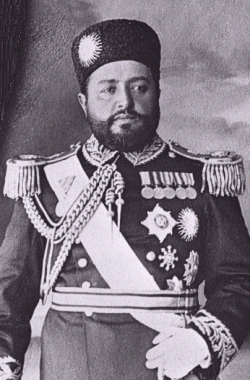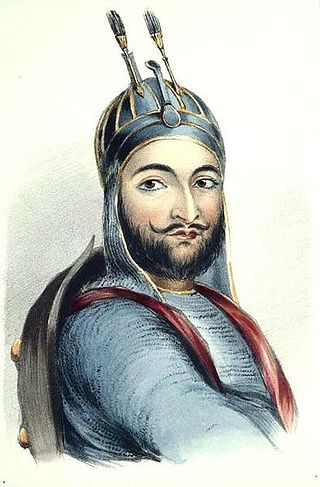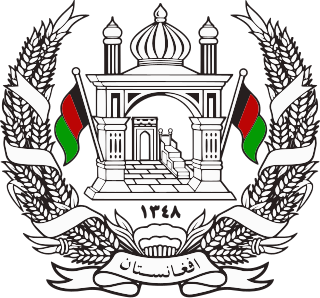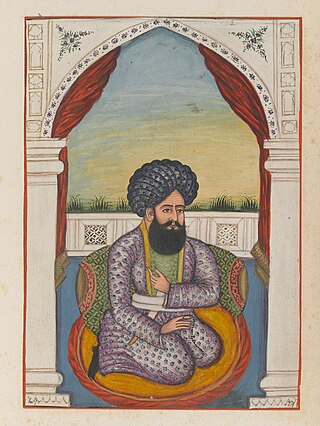
Abdur Rahman Khan also known by his epithets, The Iron Amir, was Amir of Afghanistan from 1880 to his death in 1901. He is known for perpetrating the Hazara Genocide, but also uniting the country after years of internal fighting and negotiation of the Durand Line Agreement with British India.

European influence in Afghanistan has been present in the country since the Victorian era, when the competing imperial powers of Britain and Russia contested for control over Afghanistan as part of the Great Game.

Badakhshan is a historical region comprising parts of modern-day north-eastern Afghanistan, eastern Tajikistan, and Taxkorgan Tajik Autonomous County in China. Badakhshan Province is one of the 34 provinces of Afghanistan. Much of historic Badakhshan lies within Tajikistan's Gorno-Badakhshan Autonomous Region in the southeastern part of the country. The music of Badakhshan is an important part of the region's cultural heritage.

Emir Dost Mohammad Khan Barakzai, nicknamed the Amir-i Kabir, was the founder of the Barakzai dynasty and one of the prominent rulers of Afghanistan during the First Anglo-Afghan War. With the decline of the Durrani dynasty, he became the Emir of Afghanistan in 1826. An ethnic Pashtun, he belonged to the Barakzai tribe. He was the 11th son of Payinda Khan, chief of the Barakzai Pashtuns, who was killed in 1799 by King Zaman Shah Durrani.

Sher Ali Khan was Amir of Afghanistan from 1863 to 1866 and from 1868 until his death in 1879. He was one of the sons of Dost Mohammed Khan, founder of the Barakzai dynasty in Afghanistan.

The Second Anglo-Afghan War was a military conflict fought between the British Raj and the Emirate of Afghanistan from 1878 to 1880, when the latter was ruled by Sher Ali Khan of the Barakzai dynasty, the son of former Emir Dost Mohammad Khan. The war was part of the Great Game between the British and Russian empires.

Habibullah Khan was the Emir of Afghanistan from 1901 until his assassination in 1919. He was the eldest son of the Emir Abdur Rahman Khan, whom he succeeded by right of primogeniture in October 1901. His grandfather was Mohammad Afzal Khan.

Sir Henry Mortimer Durand was a British diplomat and member of the Indian Civil Service. He is best-known as the namesake for the Durand Line, which serves as the international border between Afghanistan and Pakistan.

Wazīr Akbar Khān, born Mohammad Akbar Khān and also known as Amīr Akbar Khān, was a Barakzai prince, general, emir for a year, and finally wazir/heir apparent to Dost Mohammad Khan until his death in 1847. His fame began with the 1837 Battle of Jamrud, while attempting to regain Afghanistan's second capital Peshawar from the Sikh Empire.

Mohammad Afzal Khan was the governor of Afghan Turkestan from 1849 to 1863 and Emir of Afghanistan from May 1866 to October 1867. The oldest son of Dost Mohammad Khan, Afzal Khan was born in Kabul in 1815. His father died on 9 June 1863 followed by a civil war between Dost Mohammad Khan's sons. In May 1866 he seized power from his brother Sher Ali Khan and captured Kabul. A year later he contracted cholera and died on 7 October 1867. Following Afzal Khan's death, Mohammad Azam Khan was proclaimed Amir of Afghanistan. He was an ethnic Pashtun and belonged to the Barakzai tribe.
The following lists events that happened during 1902 in Afghanistan.
The following lists events that happened during 1904 in Afghanistan.
The following lists events that happened during 1922 in Afghanistan.
The following lists events that happened during 1929 in Afghanistan. The Afghan Civil War continued from the previous year.

The Barakzai dynasty, also known as the Muhammadzai dynasty, ruled what is now Afghanistan from 1823 to 1978, when the monarchy ended de jure under Musahiban Mohammad Zahir Shah and de facto under his cousin Sardar Mohammad Daoud Khan. The Barakzai dynasty was established by Dost Mohammad Khan after the Durrani dynasty of Ahmad Shah Durrani was removed from power. As the Pahlavi era in Iran, the Muhammadzai era was known for its progressivist modernity, practice of Sufism, peaceful security and neutrality, in which Afghanistan was referred to as the "Switzerland of Asia".

Mohammad Nadir Shah was King of Afghanistan from 15 October 1929 until his assassination in November 1933. Previously, he served as Minister of War, Afghan Ambassador to France, and as a general in the Royal Afghan Army. He and his son Mohammad Zahir Shah, who succeeded him, are part of the Musahiban.

Bilateral relations of Afghanistan and the United Kingdom of Great Britain and Northern Ireland span a long and eventful history, dating back to the United Kingdom's Company rule in India, the British-Russian rivalry in Central Asia, and the border between modern Afghanistan and British India. There has been an Afghan embassy in London since 1922 though there was no accredited Afghan ambassador from 1981 to 2001.

Sultan Mohammad Khan, also known as Ghazi Sardar Sultan Mohammad Talaei, and known by his epithet, Sultan Mohammad Khan the Golden was an Afghan chief minister and regent. He was a powerful brother of Emir Dost Mohammad Khan, the eventual ruler of Afghanistan who seized control of Kabul from him. Prior to and during the reign of Dost Mohammad Khan, Sultan Muhammad Khan Telai was chief minister and governor of various regions of Afghanistan, including Kabul, Peshawar and Kohat. He was the first of the Musahiban, a Mohammadzai dynasty that began with him and ruled Afghanistan for more than 150 years, in various forms such as emir, king or president from 1823 to 1978.
Saad-ud-Din, later Kazi Saad-ud-Din Khan, was a politician in Afghanistan under Abdur Rahman Khan and Habibullah Khan; he was, for a time, Habibullah Khan's father-in-law. He was the Governor of Herat for eighteen years, between 1887 and 1904, and he became the Chief Justice in 1914. He was bestowed the title "Khan e Ulum", which translates to "Master of Knowledge".
The Afghan Civil War was fought from 9 June 1863 to January 1869. It began as a result of Dost Mohammad Khan's death on 9 June 1863 and the subsequent power struggles among his sons. Dost Mohammad consolidated his power in the second half of his reign within his inner family. His sons were appointed governors of provinces and effectively acted autonomous from the central government. This would inevitably lead to his sons fighting for control after his death.














